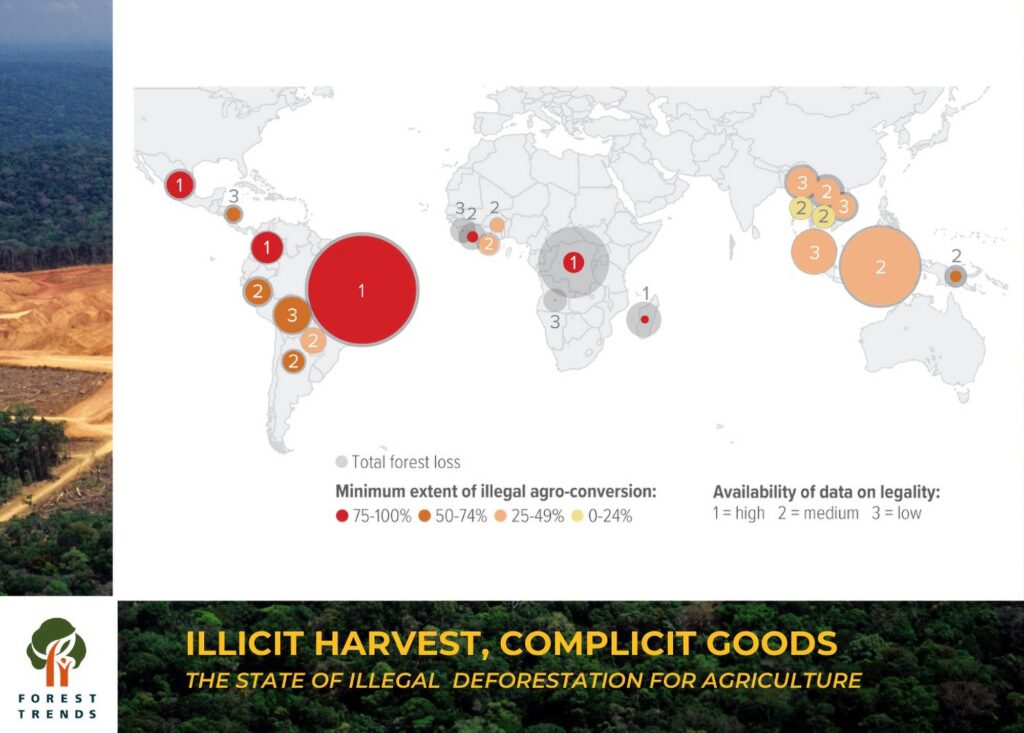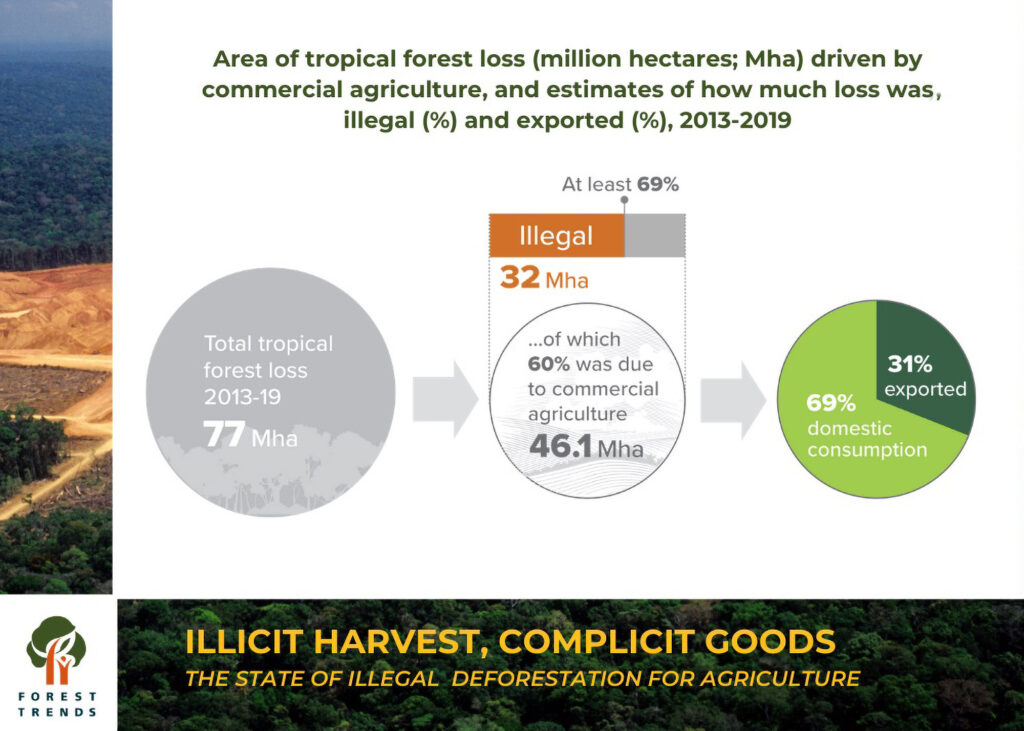The Hidden Cost Of The Daily Shop Leads To Tropical Forest Size Of Denmark Being Lost Every Year To Illegal Logging
A report has found that an area of tropical forest roughly the size of Denmark is being lost every year to illegal logging to make space to grow everyday supermarket goods such as soy, coffee, corn and beef, directly threatening climate change targets and threatening countless species.
The report titled ‘Illicit Harvest, Complicit Goods’ by Washington-based Forest Trends revealed that rainforests primarily in Brazil, Indonesia and Malaysia are being illegally destroyed at an alarming rate to grow products consumed in the USA, China, India and the European Union.
In an interview with Real Press, the lead author of the publication, Dr Arthur Blundell, said: “The report revealed that 69 percent of the tropical forests destroyed since 2013 for commercial crops were cut down illegally, violating national or international laws.”

He added: “Over a third of all products grown on the land are then exported primarily to western countries, China and India.”
The process is known as ‘agro-conversion’ which involves the destruction of tropical forest to make space to grow products such as soy and palm oil. The study found that this process has led to the overall loss of 77 million hectares of tropical forest between 2013 and 2019.
Doctor Blundell explained that this crisis is linked directly to the greatest threats facing the natural world: climate change.
He explained that the study found the illegal logging of 4.5 million hectares of tropical rainforest per year results in the release of 2.7 gigatons of emissions a year – roughly the same amount as India the world’s third-largest emitter.
He added that a large share of these emissions are coming from Brazil’s Amazon rainforest where the study found that 95 percent of all logging was done illegally.
Blundell said: “I really don’t see how us and our political leaders can pretend to aim to save the world from climate change via the Paris Climate Targets without taking aim at illegal logging.
“The report has clearly shown that the problem is too large—and growing too fast—to ignore.”
The single biggest driver behind the illegal logging practices in commercial driven agricultural expansions primarily in South America and Asia with Brazil and Indonesia experiencing the highest rates.
Much of the destruction witnessed in the Amazon and other rainforests – such as in Indonesia where 80 percent of logging is illegal – is clearing land that is then used to produce everyday goods bought in western, Chinese and Indian supermarkets.
The study found that whilst 69 percent of land (which is a conservative estimate) was being cleared to grow agricultural products over 30 percent of these products were being exported to primarily western, Indian and Chinese markets.
In a statement obtained by Real Press, Cassie Dummett, the paper’s co-author, said: “We need national regulations in the latter countries that prevent the arrival of products resulting from illegal logging.”
She added: “The majority of consumers in these countries would agree that it is absurd and immoral for what they buy in the supermarket to come from illegally deforested land.”
The main contributors to the demand for farmland that’s driving the illegal logging are the consumption of beef, palm oil, soybeans and cocoa.
The study found that 93 percent of cocoa and palm oil is cultivated on land that has been illegally logged whilst 81 percent of beef coming from tropical countries is farmed on illegally deforested land.
Whilst coffee and corn is increasingly being produced on land that has been illegally cleared of trees.
Blundell said: “It is essential that consumers who receive these products are informed and demand that their governments not import them.”
Despite pledges by governments to cut down on deforestation both legal and illegal progress has been slow especially in Brazil where the issue is most pressing due to the destruction in the Amazon.
Blundell said: “It’s becoming increasingly clear that voluntary commitments are not enough by themselves and must be met by strong regulations—with sharp teeth”.
He added that although it is clearly disheartening knowing that every one of us is contributing to the problem when we go to do the daily shop, it also gives us “leverage”.

The value of these goods is estimated to be around USD 55 Billion (GBP 38.9 Billion) per year, companies and governments could not afford to lose this money and therefore with sufficient political will the industry can change.
The study found a 28 percent increase in illegal agro-conversion from 2000-2012 although Blundell did point out some examples of positive progress.
In Brazil, up until 2012 had been drastically reducing the amount of illegal deforestation in the Amazon rainforest and in the process “did more to combat climate change than any other country in the world.”
However, he added that this trend has since been reversed and since the election of President Jair Bolsonaro the country has taken several steps back in its fight to save the Amazon.
He also used Indonesia as a positive example which despite suffering the second-highest rate of illegal agro-conversion in the study after Brazil, has been steadily reducing illegal logging since 2016.
The organisation believes that putting an end to the illegal deforestation carried out to supply consumers with palm oil, cocoa, soy and beef is a critical step in protecting our forests and our climate.
Blundell concluded by saying that the majority of the countries we are discussing such as Brazil, Indonesia and Malaysia are not “failed states” – they have the power to make progress in the area but they often lack the incentives and will to do so.
“This is our shared problem. The goods are exported for us to consume and the destruction of our environment and climate change threatens us all.”
The study can be read in full at: https://www.forest-trends.org/pressroom/new-report-tropical-forests-the-size-of-denmark-illegally-cleared-every-year-for-commercial-crops-consumed-worldwide/



